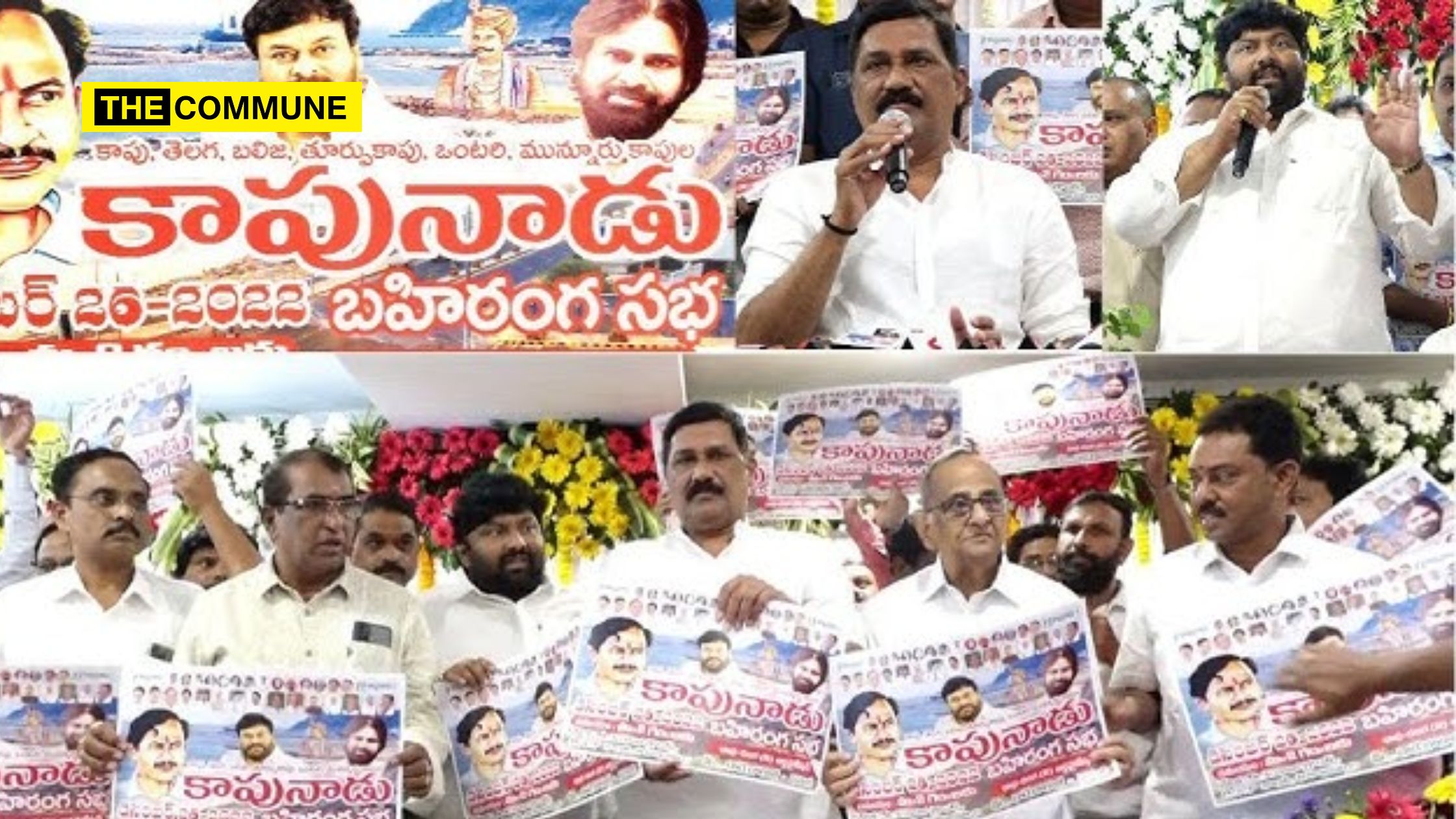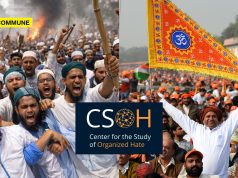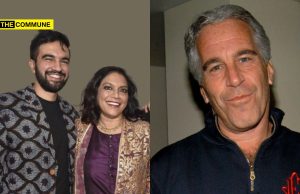
The Radha Ranga Rayal Association (RRR) organised a “Kapu Nadu” meeting in in Vishakapatnam on Monday (26 December 2022) to mark the 34th death anniversary of Vangaveeti Mohana Ranga, a prominent “Kapu” community leader in the 1980s.
The last “Kapu Nadu” meeting of significance and strength was organised in 1988 by Mohana Ranga, to whose memory the Dec 26th meeting was dedicated, shortly before he was murdered by his political rivals in Vijayawada.
The meeting’s stated mission was to bring together the various regional sub-sects within the larger Kapu caste in the two Telugu states for the purpose of political unity.
Who Are The Kapus?
Kapu refers to a social grouping of agriculturists found primarily in the southern Indian states of Andhra Pradesh and Telangana. Kapus are primarily an agrarian community, forming a heterogeneous peasant caste with several sub-sects based on regional distinctions.
They are classified as a Forward Caste in Andhra Pradesh, where they are the dominant community in the districts of East Godavari and West Godavari. They are distinct from three other Kapu communities that were present in the state prior to its bifurcation with the creation of Telangana in 2014. The Munnuru Kapu are found primarily in Telangana, the Turpu Kapu in the areas of Srikakulam, Vizianagaram and Visakhapatnam, and the Balija in Rayalaseema. The first two (Munnuru Kapu of A.P,Telangana and the Turpu Kapu of northern coastal areas of A.P) these are classified as Other Backward Classes (OBC).
The Kapus of the coastal districts are distinct from the Munnur Kapus of Telangana. While the former are fairly prosperous, the political emergence of the latter, who are part of the OBC category, is a recent phenomenon.
Kapus In The Reservation Scheme Of Things
The official government classifications rarely distinguished between the Kapu sub-castes. All Kapus were classified as forming a backward caste in 1915 by the British government of the Madras Presidency, which remained in force even after the formation of Andhra Pradesh until 1956. In that year, the government of Andhra Pradesh removed Kapus from the list of backward castes. Even though various governments have since made efforts to include them again, the efforts have not been successful. In 1968, the Anantha Raman Commission set up by the Andhra Pradesh government recognised Munnuru Kapus and Turpu Kapus as Backward Classes, but not the Kapus as a whole. The Mandal Commission set up by the Government of India in the 1980s recommended that Kapus be included among the Other Backward Classes (OBC). But the state governments were entrusted with finalising the list of castes for the OBC category. The state commission headed by N. K. Muralidhar Rao did not recommend any change to the status of the other Kapu castes.
In early 2016, the Kapus of the residual Andhra Pradesh state launched an agitation demanding the OBC status, leading to violent protests.
At thd end of his first term as Chief Minister of the bifurcated Andhra Pradesh, TDP’s Chandrababu Naidu had approved of a 5% reservation for Andhra’s Kapu community within the permissible 10% EWS quota for the economically weaker sections. The YSRCP party currently in power is yet to implement this reservation and now comes under more pressure to include a quota for the Kapus under the Supreme Court sanctioned EWS quota for economically backward classes.
The Politics Around Kapus
Aside from addressing the issue of political unity before the next Telangana state elections (latter half of 2023) and Andhra state elections (first half of 2024), the community’s leaders reminded political parties of their long standing demand for reservations within the existing quotas for the backward classes or the implementation of an existing proposition of a 5% reservation for the Kapus, within the EWS (economically weaker sections) quota.
Official data suggests that the Kapus comprise about 21% of the State’s population. Their actual numbers are claimed to be around 27%. Many in political circles agree to a figure of 25% across all the sub-sects of the Kapu community – a significant electoral number that political parties cannot afford to ignore.
Almost all political parties in both Telugu states rely in part, on the support of the Kapu sub-sects. Earlier attempts to consolidate the community had failed to bring about a consolidation of the Kapu vote for political purposes. All political parties have hitherto managed to either woo them into their fold and ranks or were able to successfully split the large Kapu vote bank on various grounds (regional affiliations, cultural or religious divisions etc).
In early December, the newly founded association ‘Radha Ranga Rayal’ had announced a “Kapu Nadu” meeting in Visakhapatnam on December 26, 2022. Kapu community leaders from all political parties in Andhra Pradesh and Telangana had been invited.
The 26th December Kapu Nadu event is politically significant as it was organized by TDP MLA and a prominent Kapu leader, Ganta Srinivasa Rao. The former Minister was quick to add, “As of now, there is no political agenda in holding the Kapu Nadu in Visakhapatnam”. This statement comes amid rumors that the leader may be re-considering his political options ahead of the next state elections.
Popular actor-turned politician K. Chiranjeevi, a Kapu leader, tried the politically unite the community in 2009 with the launch of his Praja Rajyam Party (PRP). His party secured only 18 seats and to the disappointment of many in the community, the actor chose to merge his party with the then Congress party of undivided Andhra Pradesh.
In 2014, Chiranjeevi’s younger brother and Tollywood actor, Pawan Kalyan launched the Jana Sena Party (JSP) in the aftermath of the bifurcation of the larger Telugu state into Andhra Pradesh and Telangana. His party contested in the 2019 elections but did not do well electorally. While Chiranjeevi does not currently appear to harbour political ambitions, Pawan Kalyan continues to hold rallies in the residual Andhra Pradesh state and appear to be in favourable terms with both the principal opposition parties in Andhra – TDP and the BJP.
After the meeting, Gade Balaji, the RRR organization’s president and one of the organizers of the Dec 26 ‘Kapu Nadu’ meeting, expressed disappointment that many Kapu leaders from other political parties had played it safe and not attended the meeting which was “of, by and for” the community. In the same breath, he praised the JSP party leader, Pawan Kalyan for encouraging them and supporting their goal of uniting the community.
At the meeting, former TDP minister and Kapu leader, Mudragada Padmanabham urged Chief Minister YS Jagan Reddy to implement a BC reservation to the Kapu community in the State. In an open letter to the Chief Minister on Monday, Mudragada stated that he had written the letter, on the basis of the verdict given by the Supreme Court for Economically Weaker Section (EWS) reservations as well as the current Union Minister of State for Social Justice and Empowerment, Pratima Bhoumik’s statement in Parliament recently that the State governments are free to implement the EWS reservation as per the Constitution 103 and 105 Amendment Acts.
“I appeal to you to focus on providing a BC reservation to the Kapus. I am not asking for a share in the quota of others, I ask only that you provide space for us in what remains… ” the veteran leader stated emotionally.
The Kapu Question
Should a socially powerful but economically weak group get reservations?
The Kapus claim they are deprived and backward, but those opposing the Kapu community’s demands say they are not socially deprived and have never experienced caste discrimination, although many of them in current times, may be economically weak. The recent positive verdict of the Supreme Court with regards to reservations for the economically weaker sections of society (EWS), may just be the weapon that the Kapus needed.
The Supreme Court had made it clear that there should not be any caste-based reservations in the EWS category. Back in 2019 towards the end of the TDP’s first term in government, CM Chandrababu Naidu had agreed to a 5% reservation to the Kapus out of the EWC quota of 10%. When the YSRCP government came to power in 2019, the proposed reservation failed to be implemented due to legal objections based on caste and BC category status.
With the provisions of the amended Socially and Economically Backward Classes (SEBCs), it will now be possible for the current YSRCP government to implement the 5% quota in the EWS category, as proposed by the previous TDP regime.
Click here to subscribe to The Commune on Telegram and get the best stories of the day delivered to you personally.




